

 Vol. 40 (Number 31) Year 2019. Page 29
Vol. 40 (Number 31) Year 2019. Page 29
ROMANOVA, Evgenia S. 1; RYCHIKHINA, Elina N. 2; BERSHEDOVA, Lyudmila I. 3; NABATNIKOVA, Lyudmila P. 4 & AKHTYAN, Anna G. 5
Received: 17/06/2019 • Approved: 16/08/2019 • Published 16/09/2019
ABSTRACT: The paper presents the results of the research on conflictological competence of teachers of Russian secondary educational schools. Conflictological competence of a teacher as a condition of positive interaction in the educational environment is an important and relevant topic for educational organizations. The freedom to choose a teacher, subjects, classrooms, and the need for compulsory attendance is restricted at school; subordination to a strict framework of discipline is required. These circumstances require the creation of conditions that reduce the negative factors of the educational environment and develop skills for constructive interaction. The objective of the research was to identify ways to improve the conflictological competence of teachers for qualified work with students and their parents in the interaction in a conflict-prone educational environment. The paper proposes areas of work with teachers which improve conflictological competence. |
RESUMEN: En el artículo están presentados los resultados de la investigación de la competencia en el ámbito de conflictos de profesores de los colegios de enseñanza secundaria rusos. La competencia en el ámbito de conflictos de un profesor como una condición de la interacción positiva en el ambiente educativo es un tema importante y actual para las instituciones educativas. En el colegio se limita la libertad para elegir profesores, asignaturas, aulas, existe la necesidad de asistir obligatoriamente a las clases, se requeire el cumpimiento de los marcos estrictos de disciplina. Estas circunstancias exigen crear las condiciones que reduzcan los factores negativos del ambiente educativo y formar hábitos para una interacción constructiva. El objetivo de la investigación fue determinar los métodos de competencia en el ámbito de conflictos de profesores para un trabajo calificado con los estudiantes y sus padres en la interacción en las condiciones del ambiente educativo propenso a conflictos. En el trabajo se ofrecen las áreas del trabajo con profesores que permiten aumentar la competencia en el ámbito de conflictos. |
The modern development of society with its rapid transformations leads to conflicts in all spheres. In these conditions, educational environment also becomes conflict-prone. In this environment, there is a complex system of interactions of different participants at all levels, which creates conditions for the emergence of social conflicts, the opponents of which may be teachers, administration of an educational organization, students, their parents, representatives of educational authorities, supervisory authorities, and public (Tarman & Chigisheva, 2017). Violation of this interaction as a result of destructive conflicts leads to a decrease in the effectiveness of the educational process and the effectiveness of work of the school personnel, contributes to the emergence of a negative emotional background in the organization and sometimes creates a threat to life and health of participants of the educational environment. Therefore, conflicts in the educational environment develop covering a larger number of participants and manifesting in new forms. According to a survey conducted in 2015 by the All-Russian Center for the Study of Public Opinion, the majority of the respondents believe (81 %) that "human nature is such that there will always be conflicts and wars." At the same time, another survey of this organization in the same year showed that 16 % of respondents expect the possibility of conflicts in their lives with varying degrees of probability. This contradiction leads to the conclusion that people understand that conflicts are an integral part of human life, but hope that they will pass them.
With regard to education, the concept of "competence" begins to be developed at the turn of the 50s - 60s of the ХХth century. English psychologist J. Raven (1984) forms a model of competence considering it for different professional groups, showing the assessment and ways of forming competencies. American scientist N. Chomsky (1965) considers competence from the point of view of linguistics. Depending on the type of activity, these components are filled with content which is necessary in a particular type of activity. In order to perform the duties, a teacher should have conflictological component included in the professional competence. Currently, it can be argued that there is a contradiction between the needs of teachers in the presence and application of practical skills of conflict management in the educational environment and the level of their conflictological training for this activity.
Russian authors formulate the concept of competence in education as "knowledge-based, intellectually and personally-conditioned experience of social and professional human activity" (Zimnyaya, 2006). At the same time, conflictological competence is interpreted as a set of knowledge, skills and communicative qualities of the individual, who is aimed at: effective organization of the educational process, influencing students, regulation of communicative activities in the process of solving pedagogical tasks (Makshantseva & Ovcharenko, 2015).
The growth of aggressiveness of students requires special attention of a teacher and the ability to work effectively with these negative manifestations. Therefore, some authors pay special attention to these issues. The influence of a teacher on the negative behavior of students manifested in aggression and proneness to conflict is under study (Chelysheva, 2015; Weyns et al., 2017; Rohlf et al., 2017; Bettencourt et al., 2017; Chelysheva et al., 2018). The researchers note the serious impact of various changes in society on proneness to conflict (Hubbard, 2004). The skills of conflict resolution in the school suggest the presence of experience and knowledge manifested in competence. Currently, the problem of competence formation is studied by different authors, both Russian and foreign. The impact of conflict on improving competence is thoroughly studied. Developing the concept of conflictological competence (Bershedova & Rychikhina, 2013; Zimnyaya, 2006; Makshantseva & Ovcharenko, 2015; Rychikhina, 2017; Runde & Flangan, 2010), the authors note that it is the ability to respond effectively to the emerging conflict. These authors show the ways of formation of conflictological competence for the functioning of the organization. The study of the problems of conflictological competence as a meta-cognitive basis and its increase among the students is considered (Costa, 1984; Heydenberk R. A. & Heydenberk W. R., 2005). At the same time, the researchers analyze the state of students' competence in different conditions in the field of peer relations, behavior, school, work and other activities (Masten & Coatsworth, 1998; O'Connor, 2001; Ploeg et al., 2017). Much attention is paid to the study of conflicts in education; a number of works is devoted to the formation of conflictological competence on the basis of special programmes on resolving conflicts between students (Johnson D. & Johnson R., 1996). Some authors attempted to show the ways of reducing proneness to conflict in education and creating comfortable conditions (Romanova et al., 2013, 2014; DeAngelis, 2010; Wojcik, 2012; Romanova et al., 2018).
The objective of the research on the stated problem is the definition of the conflictological competence of the modern teacher and the development of the main directions for its development.
The realization of this objective was carried out through the solution of a number of research tasks, including: to identify the level of proneness to conflict in the educational environment, to determine the attitude to the conflicts of the participants of the interaction in education, to describe the main methods used by teachers to resolve conflicts, to describe the distinctive features of the conflictological competence of a teacher, to establish the components of the conflictological competence of a teacher, to formulate the basic conceptual approaches to the formation of the conflictological competence of a teacher.
As a research methodology, a variety of research methods were used which allow obtaining representative results. As general scientific methods, the methods of analysis and comparison of secondary data which allow determining different approaches to conflicts among the participants of interaction in the educational environment were used. Among the special methods, the mass and expert surveys which allow to identify attitudes to conflicts in education, as well as a number of psychological diagnostic methods were used, in particular, questionnaire of A. Assinger (Makshantseva & Ovcharenko, 2015), which allows to identify the level of aggressiveness, questionnaire of K. Thomas "Assessment of Ways to Respond to the Сonflict" (Makshantseva & Ovcharenko, 2015), on the basis of which the prevailing styles of conflict resolution used in conflicts were determined, and questionnaire of V. M Andreev
The formation of conflictological competence of the individual in the educational environment will be considered by us as the most important personal disposition, which is provided by the consistency of value-semantic relations and is manifested in the knowledge, activity and communication of an individual.
Education at school has always been a necessary factor in the development of an individual and acquiring quality education. The survey of 126 teachers of Moscow schools showed that according to the respondents, the professionalism of a pedagogue (75.76 %) and the psychological comfort of students (71.21%) become important factors in improving the quality of education. That is why it can be argued that the issues of conflictological competence of a modern teacher become an important part of the educational process allowing realizing its main goal.
Figure 1
Conditions Necessary to Ensure
the Quality of Education at School
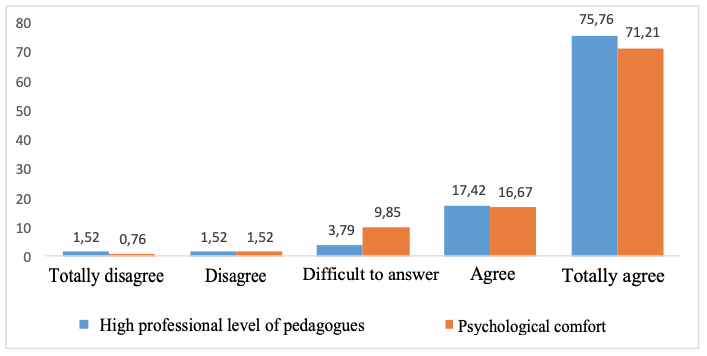
Source: the authors
However, as already noted conflicts are now taking place in the educational environment and are even increasing. Hence, there is also a need for a high level of conflictological competence of a teacher. The studies show that in education there are certain conditions that require special attention to the phenomenon under study. One of these conditions is the peculiarities of personality of modern students. The study of 227 pupils of 8th – 10th grades of Moscow by the method of A. Assinger showed that more than half of the children (64 %) have an average level of aggression and only 6 % have a high level, the rest (30 %) have non-aggressive character. A teacher working with such children needs special skills to establish contact with them, to prevent aggression in conflicts with them, and to resolve conflicts arising between students.
The presence of high proneness to conflict in educational environment is confirmed by various secondary studies. In particular, the Internet survey of 410 respondents conducted on the website http://testor.ru/anketa.aspx showed that conflicts are quite common in the educational environment. However, respondents note that conflicts in their educational organization occur frequently (24.32 %) or sometimes (43.24 %). At the same time, the respondents themselves note that they do not participate in these conflicts, but observe them from the outside.
Figure 2
The Ratio of Answers about the Frequency of Conflicts in the
Educational Organization and Getting into a Conflict Situation
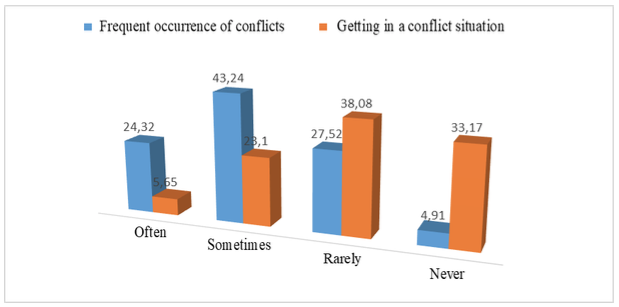
Source: the authors
Thus, the data presented in figure 2 allow us to conclude that respondents are often not able to assess objectively the conflict situation and analyze it, which indicates a lack of conflictological competence of survey participants. Therefore, in these conditions, a teacher should be able to adequately behave in a conflict-prone environment and have the ability not only to manage conflicts himself, but also to teach children to do this.
The study also included a test to assess the existing level of proneness to conflict among teachers. The result of this test showed that the level of conflict is quite high, as shown in figure 3.
Figure 3
The Results of Assessing the Level of
Proneness to Conflict Among Teachers
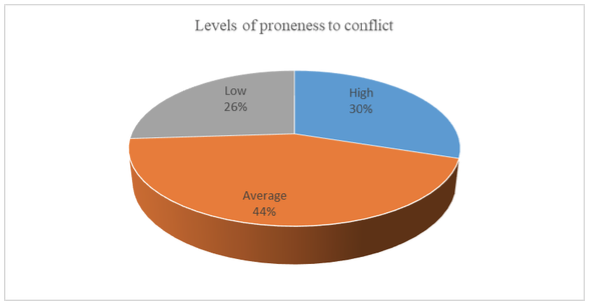
Source: the authors
On the basis of the results obtained by this method, it is possible to draw a conclusion about the average level of proneness to conflict in the surveyed group. At the same time, the result of the recent testing on the level of proneness to conflict of an individual showed those 38 teachers (30%) or almost every third have a high level of proneness to conflict. But the test showed a low level of proneness to conflict among roughly the same number of respondents (33 teachers). 55 teachers showed the average rate of proneness to conflict in the surveyed group. The correlation analysis showed a high degree of dependence between the level of proneness to conflict of personality of a teacher, his/her length of service in the specialty and age. Teachers with the length of service of 10 years or more are more likely to have a high level of proneness to conflict. However, the level of proneness to conflict decreases with age. The analysis showed that the level of proneness to conflict is mainly low among teachers older than 45 years. Other studies confirm that with an increase in the length of service and the age of the teacher and the increase in study load, the accumulation of fatigue, the increase in anxiety, low mood, vegetative-vascular disorders inevitably occur and, hence, this results in behavioral breakdowns. These clinic-psychological manifestations are the basis of the phenomenon of "burnout" in the form of emotional and intellectual exhaustion (Lvova, 2015). Psychologists observe that along with the increase of the length of service, a teacher experiences professional deformation such as a categoricalness, authoritarianism and didacticism.
One of the indicators which allow identifying the level of conflictological competence is the ability to apply different strategies of behavior in conflict depending on the situation. The use of method of K. Thomas among 126 teachers allowed determining the prevailing strategies of behavior in conflicts, which are used by teachers. The results are shown in figure 4.
Figure 4
Results of the Method of K. Thomas
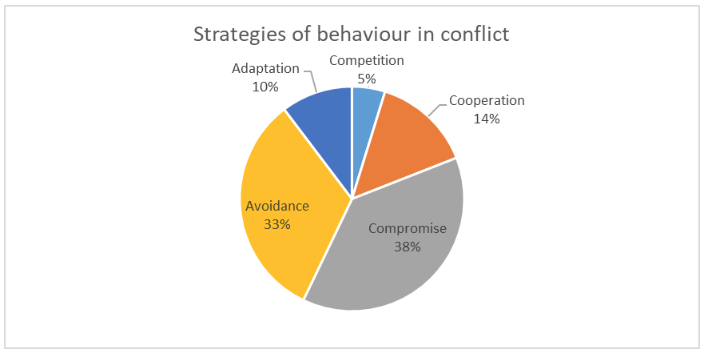
Source: the authors
The results obtained allow us to conclude that on the one hand, the majority of teachers (95 %) do not use the strategy of competition, but only 14% apply cooperation. The use of compromise (38 %) and avoidance (33 %) prevails. The analysis of these indicators suggests that one third of the subjects (33 %) are not ready to participate in conflict resolution and prefer not to notice them. The predominance of the strategy of compromise in the interactions also allows us to conclude that a significant part of the surveyed teachers are ready to make concessions in the conflict and do not solve the problem till the end, which may in the future create new grounds for conflict. Therefore, it is important for teachers to master the skills of using the strategy of cooperation in case of a conflict situation, the formation of which is possible with the ability to clearly set an objective and tasks to achieve it, mastering the knowledge of legal, religious-ethnic, political, conflictological and other nature, which will allow to understand the situation and consider it from the point of view of all the participants. As the research shows, teachers do not have a sufficient set of competencies that would help them to behave adequately in conflicts or to prevent their occurrence, to master the skills of mediation, to minimize the negative manifestations of conflicts and their consequences.
The results obtained by the method of K. Thomas are confirmed by a survey of 46 experts, who were represented by educational workers (teachers, heads of educational institutions, university scientists-teachers). The majority of participants of the expert survey (89.1 %) confirm that teachers have insufficient conflictological competence and they need the organization of targeted training in this area. At the same time, according to experts, the greatest problem for many teachers is not so much the ability to resolve conflicts in which they participate themselves, but the ability to help in the formation of these skills among students.
It is useful to apply the heuristic model schematically presented in figure 5 as the basis for the organization of education in the field of conflictological competence.
Figure 5
Model of Conflictological Competence of a Teacher
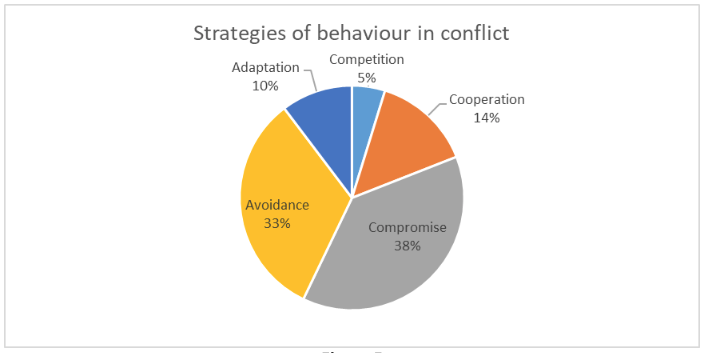
Source: the authors
The presented model shows the conflictological competence as an integral part of the professional competence. Therefore, in the professional training of teachers, the conflictological component should be included in the curricula and in the system of advanced training for teachers in separate blocks. Also, conflict-oriented specialized courses of advanced training should be developed and offered to teachers. The work of methodical associations of teachers in educational organizations, which should plan and develop work in the direction of the formation and improvement of skills in working with conflicts, is of particular importance.
In the proposed model, two directions are distinguished: the first one is aimed at the formation of the teacher's skills to manage conflicts, and the second one is the ability to teach such skills to students. This work involves work on four blocks: personal, informational, operational and educational. Therefore, it is possible to form four modules in training of teachers:
An integrated approach to the formation of conflictological competence of a teacher will allow reducing the sharpness of proneness to conflict in the educational environment and will contribute to the development of skills of constructive behavior in conflict among students.
Conflictological competence of a teacher is a constructive professional activity in a conflict-prone educational environment and it includes a set of competencies, including the availability of knowledge and skills in the field of conflictology, conflict management skills that allow to have skills for constructive management of conflicts arising in the educational organization and the system of personal qualities necessary in social relationships.
The study showed that at the modern stage of development of education, conflictological component is becoming an important part of the system of professional competence, therefore, special attention to the process of its formation is required (Makshantseva & Ovcharenko, 2015; Romanova et al., 2013). The content of the conflictological competence of a teacher is represented, on the one hand, by psychological-pedagogical, ethical, communication, sociological, conflictological knowledge and skills, as well as personal experience of their application in order to prevent and resolve conflicts in the educational environment. On the other hand, this competence involves teaching constructive behavior in conflicts that arise among students (Johnson D. & Johnson R., 1996).
Development of conflictological competence of a teacher should be carried out at all levels of his professional development: both in the period of professional training and in the process of work in the educational organization. The proposed model of conflictological competence allows determining the direction and content of training in this area. Summing up, we can talk about the possibility of conflict management in the educational environment, this activity should be organized by a teacher and include forecasting, prevention of destructive conflicts and stimulating the development of constructive ones; as well as conducting work on their settlement and resolution.
Bershedova, L.I., & Rychikhina, E.N. (2013). Conflictological Competence in the Structure of Professional Competence of a Teacher and a Class Teacher. Bulletin of Tambov University. Series: Humanities, 7(123), 116-121.
Bettencourt, A.F., Musci, R., Clemans, K.H., Carinci, J., & Ialongo, N.S. (2017). Patterns of peer- and teacher-rated aggression, victimization, and prosocial behavior in an urban, predominantly African American preadolescent sample: Associations with peer-perceived characteristics. Journal of School Psychology, 65, 83-101.
Chelysheva, Yu.V. (2015). Reference Groups and Value Orientations of Adolescents of Antisocial Behavior. Systemic Psychology and Sociology, 16.
Chelysheva, Yu.V., Akhtyan, A.G., Ivanov, A.V., Vishnyakova, V.A., & Sorikhina, V.P. (2018). Ethical concepts of pedagogy of consciousness as a foundation for the development of the school for the future. Astra Salvensis, 6, 453-462.
Chomsky, N. (1965). Aspects of the theory of syntax. Cambridge, MA: MIT Press.
Costa, A. (1984). Mediating the meta-cognitive. Educational Leadership, 42(3), 57-62.
DeAngelis, T. (2010). Managing conflict, the healthy way. GradPSYCH Magazine, 8(2), 21.
Heydenberk, R.A., & Heydenberk, W.R. (2005). Increasing meta-cognitive competence through conflict resolution. Education and Urban Society, 37(4), 431-452.
Hubbard, G. (2004). Social and Educational Effects of Technological Change. British Journal of Educational Studies, 32(2), 108-117.
Johnson, D., & Johnson, R. (1996). Conflict resolution and peer mediation programs in elementary and secondary schools: A review of the research. Review of Educational Research, 66(4), 459-506.
Lvova, S.V. (2015). Professional Motivation of Pedagogues of an Educational Institution. System Psychology and Sociology, 15, 54-62
Makshantseva, L.V., & Ovcharenko, L.Yu. (2015). Conflictological Competence of a Pedagogue and Mediative Activity in the Educational Process. System Psychology and Sociology, 2, 31-35.
Masten, A., & Coatsworth, J. (1998). The development of competence in favorable and unfavorable environments. American Psychologist, 53(2), 205-217.
O'Connor, E.M. (2001). From classroom to conflict resolution. Monitor Staff, 32(8), 26.
Ploeg, R. van der, Kretschmer, T., Salmivalli, C., & Veenstra, R. (2017). Defending victims: What does it take to intervene in bullying and how is it rewarded by peers? Journal of School Psychology, 65, 1-10.
Raven, J. (1984). Competence in Modern Society: Its Identification, Development and Release. Oxford, England: Oxford Psychologists Press.
Rohlf, H., Krahé, B., & Busching, R. (2017). The socializing effect of classroom aggression on the development of aggression and social rejection: A two-wave multilevel analysis. Journal of School Psychology, 58, 57-72.
Romanova, E.S., Abushkin, B.M., & Tkachenko, A.V. (2014). The Parental Community in the Deciding on the Questions of Educational Policy. System Psychology and Sociology, 11.
Romanova, E.S., Akhtyan, A.G., Abushkin, B., Ovcharenko, L.Yu., & Shilova, T.A. (2018). Socialization factors of schoolchildren: psychological aspect. Astra Salvensis, 6(S), 299-309.
Romanova, E.S., Ryabova, I.V., & Makshantseva, L.V. (2013). On the Creation of an Integrative Model of Psychological-Pedagogical Support of the Educational Process in a Modern School. Systemic Psychology and Sociology, 8.
Runde, C.E., & Flangan, T.A. (2010). Developing Your Conflict Competence: A Hands-On Guide for Leaders, Managers, Facilitators, and Teams. New York: Jossey-Bass.
Rychikhina, E.N. (2017). The Role of School Conciliation Services in Conflictological Education. System Psychology and Sociology, 3(23), 95-104.
Tarman, B., & Chigisheva, O. (2017). Transformation of educational policy, theory and practice in post-soviet social studies education. Journal of Social Studies Education Research, 8(2), I-IV.
Weyns, T., Verschueren, K., Leflot, G., Onghena, P., Wouters, S., & Colpin, H. (2017). The role of teacher behavior in children’s relational aggression development: A five-wave longitudinal study. Journal of School Psychology, 64, 17-27.
Wojcik, E. (2012). Innovative psychology at the high school level. Monitor on Psychology, 43(4), 64.
Zimnyaya, I.A. (2006). Key Competences – a New Paradigm of the Result of Modern Education. Internet-Journal "Eidos". Retrieved April 17, 2019 from: http://www.eidos.ru/journal/2006/0505.htm.
1. Moscow City Pedagogical University, Moscow, Russia. Contact e‑mail: RomanovaES@mgpu.ru
2. Moscow City Pedagogical University, Moscow, Russia. Contact e‑mail: RichihinaEN@mgpu.ru
3. Moscow City Pedagogical University, Moscow, Russia. Contact e‑mail: BershedovaLI@mgpu.ru
4. Moscow City Pedagogical University, Moscow, Russia. Contact e‑mail: NabstnikovaLP@mgpu.ru
5. Russian State Social University, Moscow, Russia. Contact e‑mail: AhtyanAnna@mail.ru